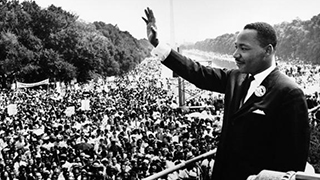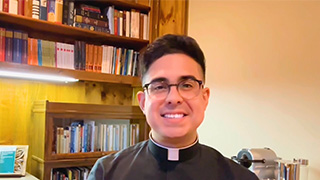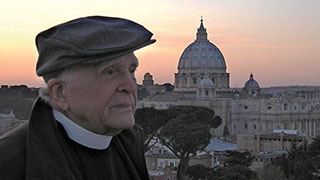University Core Honors Dr. Martin Luther King Jr.
Thursday, January 23, 2020

Coinciding with this important event, in Core II, students are continuing to study the early church, this week specifically Perpetua and Tertullian, both leaders of the church in North Africa from the early third century. Perpetua, a young nursing mother who wrote a journal from her prison cell as she awaited execution for her faith in Christ, is an iconic example of the personal commitment of living out one’s principles, a choice also embodied by Dr. King. Her diary, the first known writing by a Christian woman, recounts her fears and personal struggles (for the well-being of her baby, for her grieving and confused pagan father) as well as her profound faith that kept her grounded even in the most difficult situation. Tertullian, one of the great leaders of the African church at the time, may be, scholars believe, the person who received Perpetua’s journal and preserved it, adding the ending she could not have written about how Perpetua and her companions died in the arena in Carthage.
Dr. King once said, "If a man [or woman] hasn't found something he will die for, he isn't fit to live." In his "Mountaintop Speech," which is required reading for Core I, he talks about the power of this willingness to suffer for what is right: "For when people get caught up with that which is right and they are willing to sacrifice for it, there is no stopping point short of victory." Interestingly, Tertullian says something similar: "the blood of the martyrs is the seed of the Church" (Apologeticus, Chapter 50). Though it may look as if those who suffer and die for the truth, for justice, or for their faith are failures, they are actually winning a great victory. Dr. King, Tertullian, and Perpetua all knew this. King says, in the "Mountaintop Speech": "Like anybody, I would like to live a long life. Longevity has its place. But I'm not concerned about that now. I just want to do God's will. And He's allowed me to go up to the mountain. And I've looked over. And I've seen the Promised Land." With a similar kind of faith, Perpetua tells of her dream where she climbs a ladder, with many swords and other implements of torture along its sides, and she steps on the head of a dragon as if it were the first step. Triumphantly, she ascends to a place of natural beauty and peace. Though she realizes the dream means she will suffer and then experience heaven, she says regarding the dragon, "In the name of Jesus Christ, he will not hurt me." This attitude of strength rooted in faith pervades the atmosphere of the prison for her and her companions. Clearly, Perpetua, like King, looked at suffering and death when they are for a sacred cause differently from how many people see them in this world.
So, what do all these things have to do with "optics?" This word is used often today in academic and other circles. Someone will say, "We have to think of the optics," meaning that we have to consider how something will look and how it will appear to others. I am not opposed to that; however, in the cases of King and Perpetua, particularly, I was struck by the fact that they were less concerned about how things looked than how things are. In her prison diary, Perpetua recounts a conversation with her father, where she asks him in Socratic fashion about the nature of a vase. "Can it be called by another name other than what it is?" and her grieving father answers, "No." So, she argues, "In the same way, I am unable to call myself other than what I am, a Christian." Her identity was central to her being, and she could not, or at least certainly would not, falsify it, even to save her life. King also was true to himself, believing that it was only through that kind of integrity that one could conquer evil. In his own prison writing, the famous "Letter from the Birmingham Jail," King talks about how he does not care about the criticism of those white clergy who felt he appeared to be moving too fast in the struggle for justice. He himself makes the connection about the kind of intentional civil disobedience he practiced with that of the early Christians: "It was practiced superbly by the early Christians, who were willing to face hungry lions and the excruciating pain of chopping blocks rather than submit to certain unjust laws of the Roman Empire." In both cases, King's and the early Christians, including Perpetua, the choice was made to be right, rather than to seem so, and that choice ultimately will prevail. As King said, "I believe that unarmed truth and unconditional love will have the final word in reality. This is why right, temporarily defeated, is stronger than evil triumphant."
Ultimately, the only way to be sure that we are seen by others as good and right, to have good "optics," is—paradoxically—to care much less about them than about something else, which is living out the truth of one's moral and spiritual convictions. Though others may not understand our actions and perhaps even believe lies about us (as was the case for both Dr. King and the early Christians), in the long term, the only "optics" that really matter are how God sees us and how we see ourselves in the light of his loving but purifying gaze.
Categories: Faith and Service





